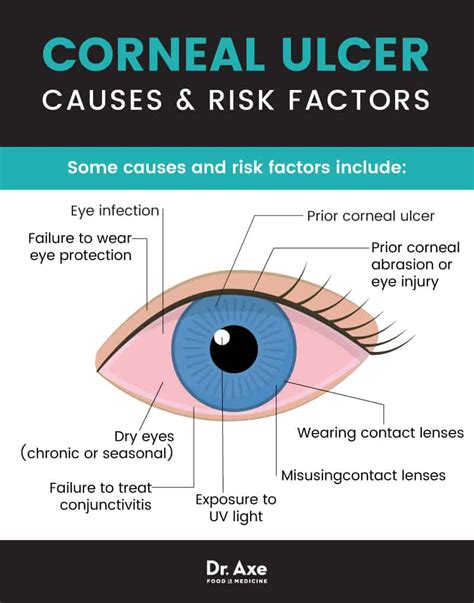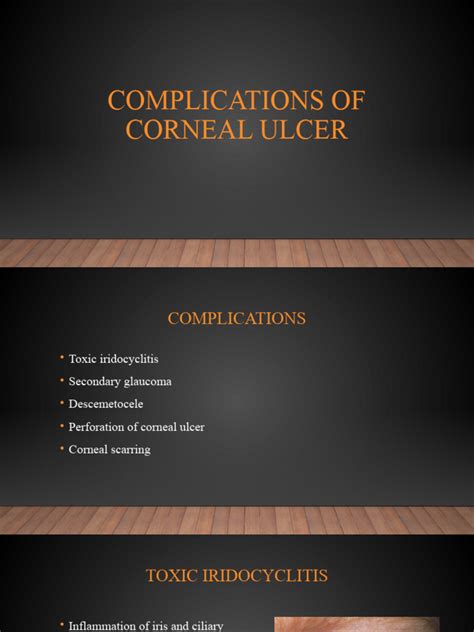Intro
Identify 7 corneal ulcer symptoms, including eye pain, blurred vision, and discharge. Learn about infection signs, vision loss, and treatment options for this serious eye condition, also known as keratitis, to protect your ocular health.
The cornea, the transparent outer layer of the eye, plays a crucial role in our vision. When it gets damaged due to an infection or injury, it can lead to a corneal ulcer. This condition can be extremely painful and, if left untreated, may cause permanent vision loss. Recognizing the symptoms of a corneal ulcer is essential to seek medical attention promptly. In this article, we will delve into the common symptoms of corneal ulcers, their causes, and the importance of early treatment.
Corneal ulcers can affect anyone, but they are more common in people who wear contact lenses, especially those who do not follow proper hygiene and maintenance procedures. Other risk factors include eye injuries, certain eye diseases, and compromised immune systems. Understanding the warning signs of a corneal ulcer can help individuals take preventive measures and seek medical help when necessary. The symptoms of a corneal ulcer can vary in severity and may develop rapidly or over time.
The impact of a corneal ulcer on daily life can be significant, affecting not only vision but also overall well-being. It is essential to be aware of the symptoms to ensure timely intervention and prevent long-term damage. By recognizing the signs of a corneal ulcer, individuals can take the first step towards protecting their vision and maintaining eye health. In the following sections, we will explore the symptoms, causes, and treatment options for corneal ulcers in more detail.
Introduction to Corneal Ulcer Symptoms

Common Causes of Corneal Ulcers
The causes of corneal ulcers can be diverse, ranging from bacterial, viral, or fungal infections to eye injuries and contact lens use. Understanding the underlying cause of a corneal ulcer is crucial for effective treatment. For instance, bacterial corneal ulcers often require antibiotic treatment, while fungal ulcers may need antifungal medications. In some cases, the cause of the corneal ulcer may be related to an underlying condition, such as a weakened immune system or certain eye diseases.Recognizing the Symptoms of Corneal Ulcers

Importance of Prompt Medical Attention
If you suspect you have a corneal ulcer, it is essential to seek medical attention immediately. Delaying treatment can lead to serious complications, including permanent vision loss. An eye doctor (ophthalmologist or optometrist) can diagnose a corneal ulcer by examining the eye and taking a thorough medical history. In some cases, additional tests may be necessary to determine the cause of the ulcer.Treatment Options for Corneal Ulcers

Prevention Strategies
Preventing corneal ulcers is always better than treating them. Practicing good hygiene, especially when wearing contact lenses, can significantly reduce the risk of developing a corneal ulcer. This includes washing your hands before handling your lenses, cleaning and disinfecting your lenses properly, and replacing them as recommended. Additionally, wearing protective eyewear during activities that could potentially injure the eye can help prevent corneal ulcers caused by trauma.Complications of Untreated Corneal Ulcers

Conclusion and Next Steps
In conclusion, recognizing the symptoms of a corneal ulcer and seeking prompt medical attention are crucial for preventing long-term damage and preserving vision. By understanding the causes, symptoms, and treatment options for corneal ulcers, individuals can take proactive steps to protect their eye health. If you or someone you know is experiencing symptoms of a corneal ulcer, do not hesitate to consult with an eye care professional.What are the common symptoms of a corneal ulcer?
+Common symptoms include severe eye pain, redness, blurred vision, sensitivity to light, and excessive tearing or discharge.
How are corneal ulcers diagnosed?
+Diagnosis is made through a comprehensive eye examination and medical history. Additional tests may be necessary to determine the cause of the ulcer.
Can corneal ulcers be prevented?
+Yes, practicing good hygiene, especially with contact lens use, and wearing protective eyewear during risky activities can help prevent corneal ulcers.
We hope this article has provided valuable insights into the symptoms, causes, and treatment options for corneal ulcers. By sharing this information with others, we can work together to promote eye health and prevent vision loss. If you have any questions or concerns about corneal ulcers or any other eye-related issues, please do not hesitate to reach out to an eye care professional. Remember, your vision is precious, and taking care of it is essential for a healthy and fulfilling life.
